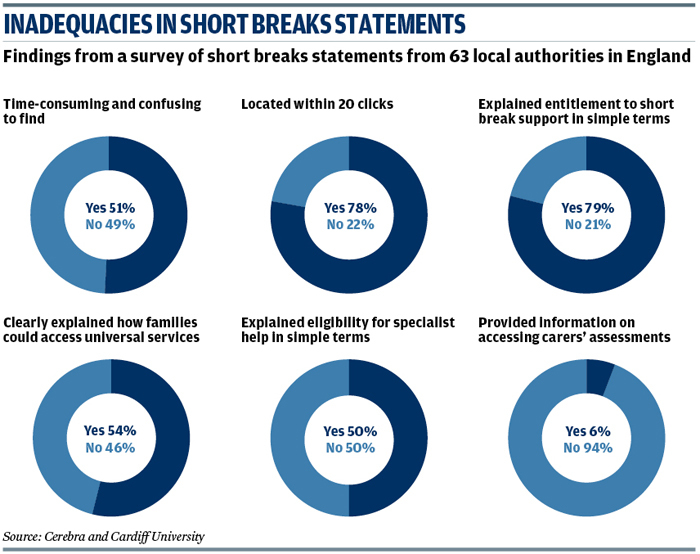Authors Sharon Howley, Brian Thorne and Professor Luke Clements
Published by Cerebra and Cardiff University, January 2016
https://w3.cerebra.org.uk/help-and-information/legal-entitlements-research-project/

SUMMARY
Students at Cardiff Law School run a Law Clinic, providing legal advice with the assistance of practicing solicitors, barristers, and the law school's own academic staff. As part of a scheme called the Cerebra Legal Entitlements Research Project, the clinic supports disabled children and their families who are encountering difficulties with statutory agencies. The project is funded by charity Cerebra.
One issue highlighted by families using the clinic was the accessibility and suitability of information provided by councils concerning "short breaks". Local authorities are required to provide a range of daytime and overnight care and leisure activities and detail these in a "short breaks services statement", which must include the criteria for assessing eligibility.
Law school researchers set out to analyse the accessibility and accuracy of the statements provided by 63 local authorities in England. Thirteen researchers undertook the survey, covering just four or five local authorities each to prevent them developing expertise in navigating council websites and more accurately replicate the experience of parents and carers.
In just over half - 51 per cent - of the council websites, researchers found locating the statement time-consuming and confusing. On average it took eight hyperlink clicks to find the statement. In 22 per cent of cases, the researchers could not locate the statement after 20 clicks. In six per cent of cases, the researchers were unable to locate the statement at all.
While 79 per cent of statements were judged easy to read, a fifth were considered over-complicated, used too much legal jargon or lacked detail. Many statements appeared not to have been updated since being posted in 2011/12, several had broken hyperlinks, and most failed to reflect recent legal changes.
The majority of local authorities - 95 per cent - gave a clear general idea of who was entitled to different types of services, usually under the headings "universal", "targeted" and "specialist". But only 54 per cent clearly explained how families could access universal services, with working links and contact details. Only half the statements clearly specified how eligibility for targeted and specialist services was determined. Meanwhile, eligibility criteria for targeted services were found to vary significantly between different local authorities.
In law, short break services are intended to support carers, enabling them to provide care more effectively. The researchers found many statements failed to reflect this, focusing almost exclusively on the support provided to the child. Only six per cent provided information on how a parent or carer could be assessed for support and only six per cent mentioned young carers. None made any reference to the rights of young carers to an assessment.
The researchers highlighted the Isle of Wight's statement as the best of those surveyed, followed by those produced by Camden, Hampshire, Liverpool, and Cheshire West and Chester.
IMPLICATIONS FOR PRACTICE
The research team concludes council websites need clearer headings and more helpful links, including a logical starting point for a search, such as a heading on the home page like "social care" or "carers". Statements could also be improved with clearer headings and language as well as a greater focus on the needs of the carers and the inclusion of information such as the right to challenge decisions. They suggest the development of a standard format or template for all authorities to use, perhaps following the format used by the Isle of Wight.
FURTHER READING
The Impact of Short Term Breaks on Families With a Disabled Child Over Time: The Second Report From the Quantitative Study, Chris Hatton and others, Department for Education, November 2011. The final element of a research programme commissioned by the Department for Education and carried out by the Centre for Disability Research at Lancaster.
Register Now to Continue Reading
Thank you for visiting Children & Young People Now and making use of our archive of more than 60,000 expert features, topics hubs, case studies and policy updates. Why not register today and enjoy the following great benefits:
What's Included
-
Free access to 4 subscriber-only articles per month
-
Email newsletter providing advice and guidance across the sector
Already have an account? Sign in here

